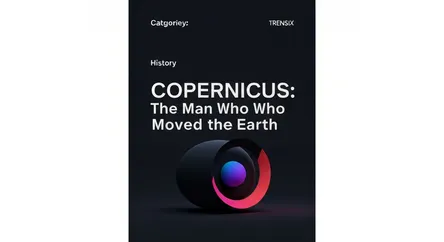History
Copernicus: The Man Who Moved the Earth

Discover Nicolaus Copernicus, the astronomer who revolutionized our understanding of the universe by placing the Sun, not the Earth, at its center.
What is it?
Nicolaus Copernicus (1473-1543) was a Polish astronomer and mathematician who formulated a revolutionary model of the universe. In his book, De revolutionibus orbium coelestium (On the Revolutions of the Celestial Spheres), published just before his death, he proposed that the Earth and other planets revolve around the Sun. This heliocentric, or Sun-centered, theory contradicted the long-held geocentric model by Ptolemy, which placed a stationary Earth at the center of the universe and was supported by the Church for centuries. Copernicus's work was a major event in the history of science, sparking the Copernican Revolution.
Why is it trending?
Copernicus remains a key figure in history because his work initiated a fundamental shift in human perspective, often called the Scientific Revolution. His model challenged not just astronomical convention but also deeply rooted philosophical and religious doctrines, demonstrating that observation and mathematical proof could overturn centuries of established belief. This shift from dogma to empirical evidence is a core principle of modern science. The legacy of his courage to propose a radical, evidence-based view of the cosmos continues to inspire discussions about the nature of scientific progress and challenging the status quo.
How does it affect people?
Copernicus's theory fundamentally changed humanity's place in the universe, removing us from the center stage. This "Great Demotion" was a crucial step in developing modern astronomy and physics, paving the way for later scientists like Galileo, Kepler, and Newton. Today, every satellite launched, space mission planned, and our entire understanding of the solar system is built upon the heliocentric foundation he established. His revolution affects everyone by shaping our modern, scientific worldview and underscoring the importance of questioning assumptions to pursue a more accurate understanding of reality.